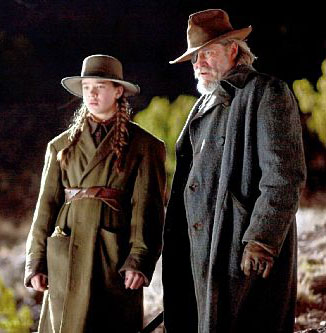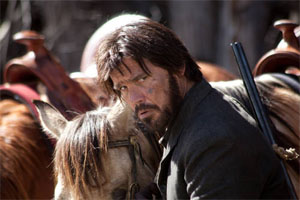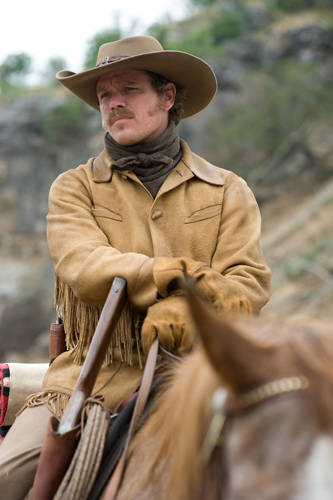True Grit (2010, Dir. Joel & Ethan Coen):
It’s the Old West, and three murderers are about to be hanged: two white Americans, one Injun. The first man delivers a tear-stained soliloquy about the perils of wickedness. The second man, unrepentant, says that the victim had it coming — too bad he killed the wrong guy. The Injun? Before he gets a chance to say his piece, the execution hood is clamped over his head.
If that sounds like a joke, it is, and no surprise, it comes from the Coen brothers, who like their jokes. Even their adaptation of Cormac McCarthy’s No Country for Old Men, which was about as funny as a heart attack, found deadpan humor in the way Javier Bardem’s superhuman killer went about his business — invincible and almost courtly in his elocutions, he was an angel of death that the Dude from The Big Lebowski might have conjured up in a pothead haze. Although No Country was looked upon as a departure from the Coens’ previous body of work, it was also a summation. They’ve done everything from period comedies to genre homages to slapstick dramas, but through it all they’ve been preoccupied with the human animal, or more precisely, the American animal: constantly conniving, defined by near-affable exteriors and violent impulses, gifted with gab and an absurd naivete, just clever enough to land itself in fatal difficulties. While previously the Coens looked at the American condition with a wry affection, the conclusion of No Country contains nothing but despair, with the carnival of grotesqueries we’ve witnessed in the previous two hours steamrolled by a vision of loneliness in the wilderness, and death.
 And now comes True Grit, another movie based on a novel (this one by Charles Portis), a remake no less, and it’s the flip side of the coin from No Country. Where No Country essayed a modern take on the western, True Grit sets its sights lower: it’s a one-joke flick, from start to finish. But what a joke!
And now comes True Grit, another movie based on a novel (this one by Charles Portis), a remake no less, and it’s the flip side of the coin from No Country. Where No Country essayed a modern take on the western, True Grit sets its sights lower: it’s a one-joke flick, from start to finish. But what a joke!
The story (and much of the dialogue) follows the same roads trod by the earlier version Henry Hathaway directed in 1969: determined to avenge the death of her father at the hands of low-rent horse thief Tom Chaney (Josh Brolin), teenage Mattie Ross (Hailee Steinfeld) enlists the help of sometime-marshal “Rooster” Cogburn (a grizzled-out Jeff Bridges) to track the outlaw. On their quest they’re joined by dandy Texas ranger LaBoef (Matt Damon), who’s after the same quarry for monetary reasons of his own.
Hathaway’s True Grit was a star vehicle for John Wayne, who hammed it up magnificently as Cogburn (and earned his sole Oscar in the process, natch), but apart from his performance and a classic showdown with Lucky Ned Pepper (Robert Duvall), the head of the gang Chaney seeks refuge with, it’s a standard-issue western, quaintly dated from the the moment it was released (Sam Peckinpah’s game-changing The Wild Bunch had assaulted theaters a week before). The Coens aren’t interested in rewriting the DNA of the western either; they prefer to treat the material with an ironic distance, reveling in the incongruities within Portis’ source material. Cogburn may be the one who is proclaimed to have “true grit,” but in point of fact it is irrepressible Mattie Ross who has the grit, although in her case it’s more iron than sand. Single-minded, persuasive, sensible, and utterly pitiless, she thinks nothing of berating a cowboy who doesn’t have the courtesy to stand when a lady is present, and yet in her insistence on being the one who pulls the trigger on Chaney, this prim youngster is the bloodthirstiest of them all. (There’s the joke for you.)
 Mattie is the bright star around which all the other rough-house characters revolve, although these satellites are dark indeed: they’re a rogue’s gallery of deformed, maladjusted, or just plain scruffy misfits. Brolin’s Chaney (in what amounts to a cameo) is one step up the evolutionary ladder from a Neanderthal, hardly conscious of himself, never mind the crimes he’s guilty of — he cuts an incongruous figure, scarcely deserving of the Ahab-like obsession Mattie has with him. Barry Pepper’s Ned Pepper may talk like a gentleman outlaw, but with spittle flying from his harelip, he’s all grunge, and that’s not even mentioning his gang, one of which expresses himself purely through barnyard animal sounds. Even the conventionally handsome Matt Damon doesn’t escape ridicule and physical humiliation — his talky LaBoef is a showboater with loud spurs and a loud mustache, given to self-aggrandizement, and his penalty is suffering the ultimate injustice of having his tongue split in two.
Mattie is the bright star around which all the other rough-house characters revolve, although these satellites are dark indeed: they’re a rogue’s gallery of deformed, maladjusted, or just plain scruffy misfits. Brolin’s Chaney (in what amounts to a cameo) is one step up the evolutionary ladder from a Neanderthal, hardly conscious of himself, never mind the crimes he’s guilty of — he cuts an incongruous figure, scarcely deserving of the Ahab-like obsession Mattie has with him. Barry Pepper’s Ned Pepper may talk like a gentleman outlaw, but with spittle flying from his harelip, he’s all grunge, and that’s not even mentioning his gang, one of which expresses himself purely through barnyard animal sounds. Even the conventionally handsome Matt Damon doesn’t escape ridicule and physical humiliation — his talky LaBoef is a showboater with loud spurs and a loud mustache, given to self-aggrandizement, and his penalty is suffering the ultimate injustice of having his tongue split in two.
Goudy: How many men have you shot since you became a marshal, Mr. Cogburn?
Rooster Cogburn: I never shot nobody I didn’t have to.
Goudy: That was not the question. How many?
Rooster Cogburn: Uh… shot or killed?
Goudy: Oh, let’s restrict it to “killed” so we may have a manageable figure.
 It’s a topsy-turvy vision of the West on display in this film, with the only honor to be found among thieves and killers. Pepper attempts an honorable trade with Cogburn and is dully repaid with betrayal. Rueful Chaney offers Mattie a clear shot at his chest. Members of Pepper’s gang are only outraged when one of them threatens to betray their brotherly code and squeal to the authorities. Cogburn, ostensibly the representative of justice in the film, is revealed to be an unreformed Rebel who participated in Civil War massacres with Quantrill’s bushwhackers, and doesn’t think twice about setting up a cowardly ambush or shooting a man in the back. All this may sound like ingredients for a rip-snorting, cynical parody of a Western, but the Coens underplay the hijinks. These aren’t big events that we’re witnessing, and the Coens are aware of that fact; they present them to us with the measured ease of a campfire yarn. Thanks to Roger Deakins’ cinematography (the very definition of “burnished”) and Carter Burwell’s period-perfect score of piano hymns, the film is a comfy sigh compared to No Country for Old Men‘s death rattle.
It’s a topsy-turvy vision of the West on display in this film, with the only honor to be found among thieves and killers. Pepper attempts an honorable trade with Cogburn and is dully repaid with betrayal. Rueful Chaney offers Mattie a clear shot at his chest. Members of Pepper’s gang are only outraged when one of them threatens to betray their brotherly code and squeal to the authorities. Cogburn, ostensibly the representative of justice in the film, is revealed to be an unreformed Rebel who participated in Civil War massacres with Quantrill’s bushwhackers, and doesn’t think twice about setting up a cowardly ambush or shooting a man in the back. All this may sound like ingredients for a rip-snorting, cynical parody of a Western, but the Coens underplay the hijinks. These aren’t big events that we’re witnessing, and the Coens are aware of that fact; they present them to us with the measured ease of a campfire yarn. Thanks to Roger Deakins’ cinematography (the very definition of “burnished”) and Carter Burwell’s period-perfect score of piano hymns, the film is a comfy sigh compared to No Country for Old Men‘s death rattle.
While Mattie stirs the film’s narrative momentum, the film’s heart is with Bridges’ Cogburn. With his lumpy body and one eye buried beneath a patch, he seems like an outsize parody at first, his dialogue slurring its way out of his mouth like molasses in February. But as the film progresses his presence deepens — he may be a souse who shoots first and asks questions later, but we can see weatherbeaten clarity in his one good eye, and dexterity in the way he springs into action when danger is near. He also gets to perform the film’s one heroic act, saving Mattie in the clutch with an unfussy nobility. Like the unwashed Americans that the Coens are fond of observing, Cogburn is far from anyone’s conception of a good man, but in the unruly West depicted in this film, he might just be the right one. And for the first time since Frances McDormand’s kind-hearted cop Marge in Fargo, we get the impression that it might not be such a joke after all.

